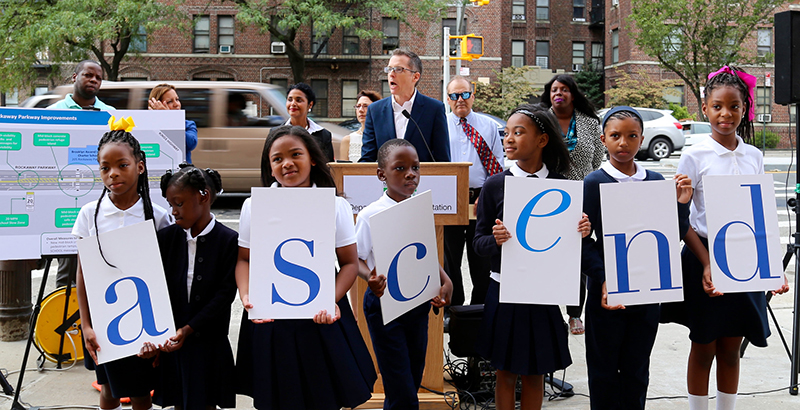Pondiscio: Urban Charter Schools Offer Unprecedented Educational Opportunity for Historically Underserved Kids. Now, They’re Under Attack From Within. Who’ll Stand Up for Them?

If you’ve been around education long enough to remember Waiting for Superman and a broom-wielding Michelle Rhee scowling from the cover of Time magazine, you remember a time when to be an education reformer was to embrace conflict, even to feel ennobled by it. You were fighting for kids and against adult self-interest. “No excuses” was more than a label for a handful of renegade charter schools, it was a moral imperative. For generations, schools had failed children, particularly children of color. There must be no excuses made for these institutional failures, and none accepted.
The brand of reform that led with its chin could be arrogant and self-righteous, alienating as many as it attracted. But it’s sobering to contemplate the utter collapse of that combative mindset and the degree to which the conditions that led to its rise have fallen down a memory hole.
Steven Wilson, the founder and erstwhile CEO of the Ascend charter school network, gave a talk last month at the annual meeting of the Philanthropy Roundtable on “Cancel Culture: How to Protect Charter and Autonomous Schools.” If you didn’t hear about it — and you did not — it’s because the fight has been drained from the reform movement. Those who founded and run such schools and built their pillars — academic achievement and high expectations for all students — are in a defensive crouch, stunned, seething or bending a knee to a new social justice orthodoxy that now frames their effort to advance racial justice as just the opposite: an attempt to impose white supremacy on Black and brown children.
Wilson began his talk by noting, correctly, the disappointing results of the classic education reform agenda. The standards, testing and accountability revolution has not produced commensurate improvements in student outcomes to justify the $4 trillion in additional money spent on public education over the last 30 years, or the degree of disruption that reform has wrought on American education. The one clear exception, he noted, are urban charter schools, particularly those that emerged from the “no excuses” movement. It cannot be denied: KIPP, Achievement First, Yes Prep, Uncommon Schools and similar networks of high-performing charter schools that sprang up in most major American cities in the last 25 years have launched to college tens of thousands of low-income kids of color who otherwise would not have had the opportunity had the ed reform era never occurred.
“While we should be celebrating these path-breaking schools, they are under attack,” said Wilson, noting that nearly every large charter network is the target of an Instagram site with anonymous postings portraying them as irredeemably racist. “If we continue to be bullied into silence, then we will also be part of the machinery of white supremacy,” reads one such post on the “Being Black at KIPP” Instagram site. “We would have done nothing to prevent the traumatizing and terrorizing of a generation.”
The response to these broadsides, from charter operators, as well as their supporters and advocates, has been tepid at best. KIPP, the largest of the major charter management organizations, sued for peace. “As a white man, I did not do enough as we built KIPP to fully understand how systemic and interpersonal racism, and specifically anti-Blackness, impacts you and your families,” founder David Levin wrote in a letter to the network’s alumni earlier this year. “It is clear that I, and others, came up short in fully acknowledging the ways in which the school and organizational culture we built and how some of our practices perpetuated white supremacy and anti-Blackness,” he concluded. But as Wilson observed, KIPP’s “very purpose has been to advance racial justice.”
It’s been a painful comeuppance for charter school leaders and political progressives, who believed they were squarely on the side of Black and brown students and families, and who spent the last few decades building and running institutions nearly unprecedented in American education: alternatives to poorly run neighborhood schools in some of the nation’s most impoverished urban communities, and a reliable pathway into college and the promise of lives of upward mobility. It is stunning, even incomprehensible, to learn that all this time they were actually racists, traumatizing and terrorizing Black and brown students, and imposing white supremacy on them.
It’s unsurprising that young alumni and staff, fresh from college campuses and steeped in the ideas and language of intersectionality and critical race theory, have brought revolutionary zeal to bear on behalf of students. What is harder to reckon with — and to forgive — is the silence of the broader charter school community, education reformers, philanthropists, politicians and other supporters who, as Wilson argued, should be celebrating and defending these schools and pushing back against those who would cancel them, nullify their contributions to social justice and even threaten their survival. “We have to ask if charters will survive our broken and divided time, or if this once-in-decades achievement, one with the promise to remake American education, will atrophy and be forgotten,” he said.
Wilson, as readers may recall, was fired from Ascend last year after publishing an essay arguing that “democratic education” must strive to “grant all students the knowledge and faculties of mind that had once only been afforded the elite.” His unforgivable sin was to defend the liberal arts tradition for all students, and to put a stake in the ground against anti-intellectualism, resisting the ideas codified in a diversity training workshop for New York City educators that academic values like “objectivity” and “worship of the written word” represented “damaging characteristics of white supremacy culture.” If we want truly excellent schools, Wilson wrote in a June 2019 message to Ascend students and families, “It’s time for intellectual passion to come out of the closet.” It seems inconceivable that an educator could be fired over such anodyne views. But here we are.
His cancellation makes Wilson merely the most visible casualty of a moment and mindset that has been roiling charter schools for years, cowing their leaders into silence or abject self-abasement to appease the cancellers. In both his talk and a subsequent Q&A with Max Eden of the Manhattan Institute, Wilson said he was not at liberty to discuss his dismissal from Ascend, but he was outspoken on the danger of “slipping into a kind of long-abhorred racial essentialism” where children of different races are presumed to possess distinct capacities and academic achievement is scorned as “whiteness.”
“Today’s college graduates — and, now, charter school faculty — are idealistic, engaged and demand change. But liberal education’s traditional commitment — to reason, free speech and an encounter with diverse and at times uncomfortable ideas — are losing their authority,” Wilson said. “The staggering challenges the next generation will inherit can only be conquered by application of objective inquiry, technical expertise and international cooperation that transcends ‘identity.’ To even hint to children today that this monumental undertaking of their generation, this salvation, is ‘whiteness’ — that is the ultimate disempowerment, the final exclusion.”
If anything, Wilson understates the risk, to both liberal education and the charter schools that have made it available to a generation of low-income Black and brown families. Over the last several months I have spoken with dozens of charter leaders and education reform veterans. The self-censorship and seething Wilson described is very much in evidence. The risk to their mission is significant, even existential. One charter network leader told me his primary challenge at present is trying to serve parents “who are bought into the American Dream, hard work, education, character building and rigor” while responding to the demands of “a vocal group of staff who are far more progressive and privileged” and who push back aggressively on the schools’ curriculum and culture. “They’re shocked by the level of specificity we expect from our students,” he told me. “However, I really don’t know any other way to improve [students’] future lives other than a rigorous education.”
What veteran charter school leaders have that young staffers and alumni lack is memory of the times before these schools and networks existed. “We forget that when charters began, urban public schools were often chaotic, unruly and dangerous. The peer culture derogated academic achievement,” Wilson said in his Philanthropy Roundtable speech. “Teachers struggled to maintain order. Students resented their schools’ diffidence.” Yet even this feature of high-performing charter schools has been weaponized and given a sinister cast by antagonists. The recent much-praised podcast “Nice White Parents” suggested that calling attention to “chaos and disruption” in schools is a racist dog whistle. But the parents of charter school kids have not forgotten; it’s why they continue to swell charter school waiting lists. Indeed, parents are the overlooked constituency in all this. If high-performing charters were the hotbeds of oppression and racism their critics insist, families would stay away in droves. But parent satisfaction levels remain above 90 percent at every network I have contacted in the past several months. With few exceptions, parents at KIPP, Uncommon, Success Academy and other networks say they would enthusiastically recommend their child’s school to family and friends.
Also unremarked upon is the degree to which “no excuses” schools have adapted in response not just to external pressure, but feedback gleaned from students about their experiences. KIPP made significant changes to its curriculum and culture years ago, when faced with disappointing college persistence and graduation rates. Wilson’s own Ascend network won widespread attention and praise when it adopted restorative justice practices. This willingness, even eagerness, to adapt is not a repudiation of the “no excuses” model but an illustration of it. The loudest critics of “carceral” schooling are warring against ghosts, responding to a model that in many cases looks nothing like 20 years ago. Charter leadership is also increasingly diverse at both the network and building level, further blunting the critique that these schools perpetuate anti-Blackness.
When I attended Wilson’s talk via Zoom, I expected it would provoke a strong response, at least privately. People who take controversial stands in education policy and practice are often contacted afterward by friends and colleagues who say, “Thank you for speaking out. I just wish I could support you publicly.” When I spoke with Wilson a week after his talk, I was surprised to learn that there had been no response at all. This suggests lack of awareness of the fragility of these schools and a failure to grasp the nature of the threat they face, or simply fear that to share Wilson’s concern is to share his fate. Or perhaps it’s battle fatigue. One prominent charter founder describes “quite a few conversations” with reform colleagues who “just want to get out of education entirely.” Others attribute the muted response to a crisis of confidence. Urban charters have produced results that are far better than average for low-income kids but below the ambitions of their founders and early boosters. “If our results really were spectacular,” says one advocate, “I don’t think we’d be so much on the defensive.”
Because the “no excuses” moment and mindset have receded from memory, fallen into disfavor or may be foreign to younger reformers, it is important to recall the principles upon which urban charter networks were founded and that fueled their rise. They emphasized order, urgency and student agency, and sought to inspire resilience and excellence — in personal conduct, academic effort and performance. These are universal virtues that remain worth fighting for; the effort to rebrand them as characteristics of a white supremacist culture are risible — and are seen as such by the schools’ parents — and must be firmly resisted and rejected. The focus on outcomes and achievement and relentless effort in their pursuit stood — it still stands — in sharp relief to the failure factories attended by the vast majority of America’s low-income children of color, where little is expected or offered. If those features of the “no excuses” tradition are cast as inherently racist, then a swift and unarrested decline into mediocrity or worse is a foregone conclusion, not just in urban charter schools, but in education at large. There will be no counterweight or models to point to as a credible alternative to continued school failure.
Steven Wilson was polite. I will be pointed: The fight has gone out of an education reform movement that has too little to show for itself. The reluctance of charter school proponents to defend the one thing it’s gotten right will be its death knell.
Robert Pondiscio is a senior fellow at the Thomas B. Fordham Institute. He is the author of the new book “How the Other Half Learns” (Avery, 2019).
Get stories like these delivered straight to your inbox. Sign up for The 74 Newsletter

;)

